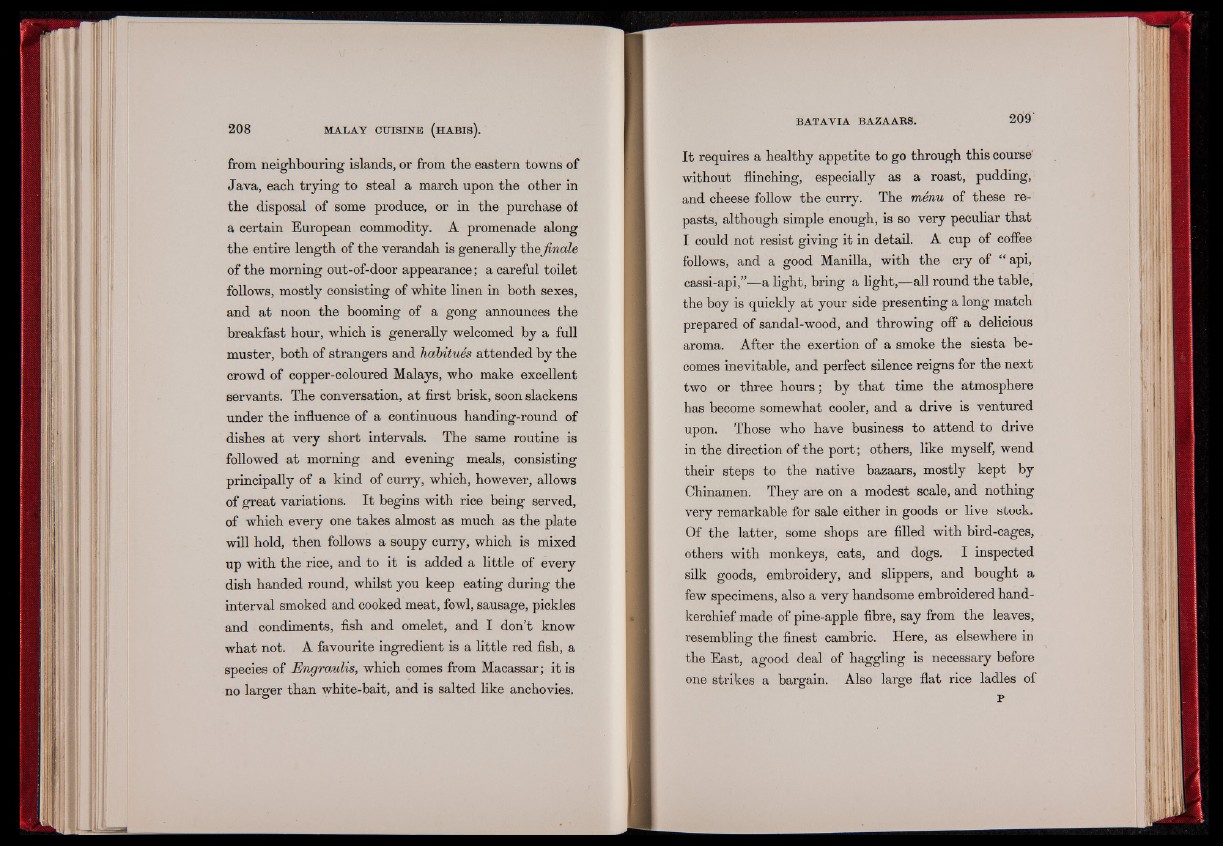
208 MALAY CUISINE (h ABIS).
from neighbouring islands, or from the eastern towns of
Java, each trying to steal a march upon the other in
the disposal of some produce, or in the purchase of
a certain European commodity. A promenade along
the entire length of the verandah is generally the finale
of the morning out-of-door appearance; a careful toilet
follows, mostly consisting of white linen in both sexes,
and at noon the booming of a gong announces the
breakfast hour, which is generally welcomed by a full
muster, both of strangers and habitues attended by the
crowd of copper-coloured Malays, who make excellent
servants. The conversation, at first brisk, soon slackens
under the influence of a continuous handing-round of
dishes at very short intervals. The same routine is
followed at morning and evening meals, consisting
principally of a kind of curry, which, however, allows
of great variations. I t begins with rice being served,
of which every one takes almost as much as the plate
will hold, then follows a soupy curry, which is mixed
up with the rice, and to it is added a little of every
dish handed round, whilst you keep eating during the
interval smoked and cooked meat, fowl, sausage, pickles
and condiments, fish and omelet, and I don’t know
what not. A favourite ingredient is a little red fish, a
species of Engraulis, which comes from Macassar; it is
no larger than white-bait, and is salted like anchovies,
I t requires a healthy appetite to go through this course'
without flinching, especially as a roast, pudding,
and cheese follow the curry. The menu of these repasts,
although simple enough, is so very peculiar that
I could not resist giving it in detail. A cup of coffee
follows, and a good Manilla, with the cry of “ api,
cassi-api,”—a light, bring a light,—all round the table,
the boy is quickly at your side presenting a long match
prepared of sandal-wood, and throwing off a delicious
aroma. After the exertion of a smoke the siesta becomes
inevitable, and perfect silence reigns for the next
two or three hours; by that time the atmosphere
has become somewhat cooler, and a drive is ventured
upon. Those who have business to attend to drive
in the direction of the port; others, like myself, wend
their steps to the native bazaars, mostly kept by
Chinamen. They are on a modest scale, and nothing
very remarkable for sale either in goods or live stock.
Of the latter, some shops are filled with bird-cages,
others with monkeys, cats, and dogs. I inspected
silk goods, embroidery, and slippers, and bought a
few specimens, also a very handsome embroidered handkerchief
made of pine-apple fibre, say from the leaves,
resembling the finest cambric. Here, as elsewhere in
the East, agood deal of haggling is necessary before
one strikes a bargain. Also large flat rice ladles of